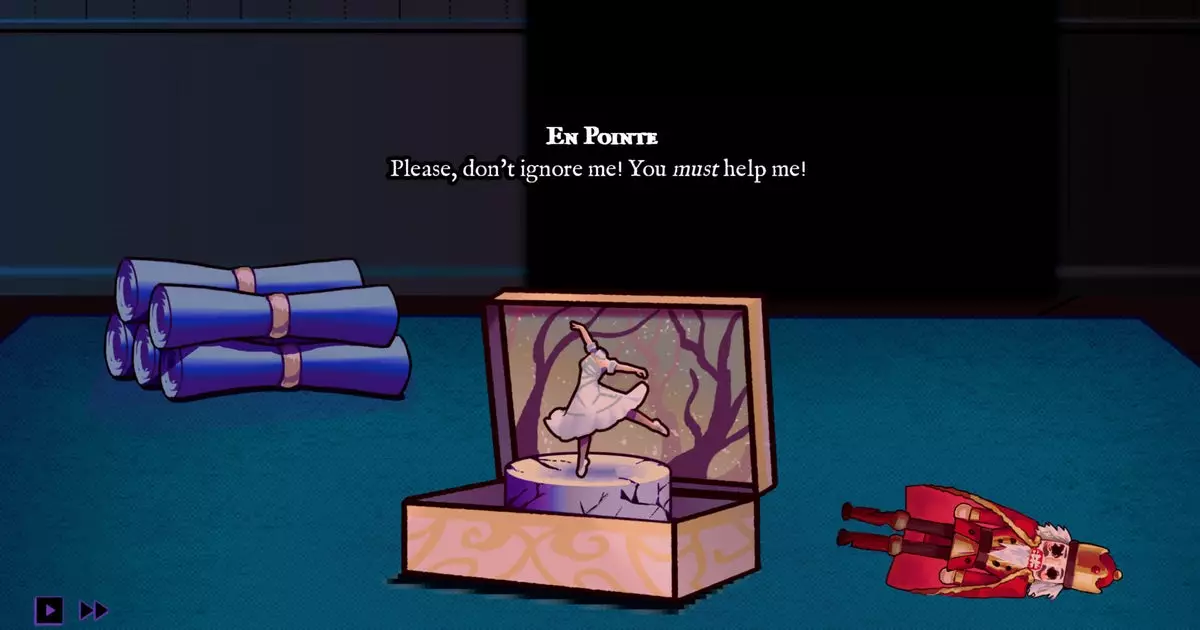At first glance, Toy Box presents itself as an innocent and festive game, reminiscent of holiday-themed entertainment. However, this initial impression quickly dissipates upon viewing the game’s trailer, revealing a twisted and dark narrative lurking beneath the surface. The game cleverly subverts expectations by immersing players in a world where toys wield sinister personalities, forcing them to engage in a macabre and morally ambiguous task. As a free visual novel, Toy Box grapples with unsettling themes while enticing players into a moral dilemma that tests their empathy and conscience.
In Toy Box, you assume the role of a toy inspector working for the enigmatic Grand Toy Maker. This shadowy figure, only partially visible to players, assigns you the grim task of disassembling animated toys—five distinct characters, each harboring their own backstories and traumas. The core gameplay mechanic revolves around following the Grand Toy Maker’s eldritch instructions to either “salvage” these toys or condemn them to a fiery end in the incinerator. The choice between mercy and condemnation creates a deeply engaging, albeit discomforting, dilemma.
What makes this experience particularly haunting is the sentience of the toys. As you begin to dismantle them, they communicate their memories and experiences, revealing tales of suffering and darkness. The juxtaposition of their playful design with their macabre content contributes to a strong sense of unease. Players are confronted with a challenging ethical question: How can one justify sacrificing a small, talking ballerina, even if she harbors malevolent thoughts?
The disturbing nature of Toy Box is magnified by its exploration of themes such as malice, suffering, and the implications of object possession. The toys are not merely passive entities; they possess a degree of consciousness, raising questions about autonomy and the consequences of dismantling creatures that appear to exhibit humanity. The game effectively utilizes the uncanny nature of toys—the unsettling gray area they occupy between animate and inanimate—making players ponder their relationship with these objects.
Such themes resonate with broader philosophical inquiries into the nature of existence, the significance of created beings, and the moral responsibilities associated with power. The darker elements are accentuated through the clever narrative design, revealing a world that mirrors the grotesque aspects of human experience. While the Grand Toy Maker maintains an air of joviality, his actions reflect a critical commentary on authority and the often exploitative nature of creative power.
Despite the absence of explicit sexual content, Toy Box is rife with deeply disturbing themes. With content warnings encompassing depictions of blood, body horror, and child abuse, it’s clear that the narrative aims to evoke discomfort. Rather than glorifying violence, the game offers a grim reflection on the darkness of existence, compelling players to examine their motivations and moral compass as they navigate this unnerving landscape.
Interestingly, Toy Box does not feel gratuitous or exploitative in its portrayal of sensitive subjects. Instead, it reveals the fragile balance between innocence and horror, reminiscent of classic tales such as Pinocchio, but laced with the oppressive dread found in contemporary horror narratives like Five Nights at Freddy’s.
The developers, DEADline Studios, hail from a small but impactful background, identifying as a POC and queer-owned studio. They strive to tell profound stories that delve into the complexities of the human experience, unafraid to confront uncomfortable truths. Their portfolio, including projects like Fool’s Paradise, signifies a commitment to narratives that challenge conventional storytelling norms.
Toy Box serves as an example of how innovative gameplay mechanics can shape narratives. The act of disassembling toys to uncover their stories is a powerful metaphor for exploring deeper human emotions and experiences. This unique storytelling method engenders a compelling plea for empathy, urging players to engage critically with objects and their inherent narratives. One can only hope that more games will dare to tread this captivating line between horror and humanity, paving the way for fresh and thought-provoking experiences in the gaming landscape.
Toy Box is a remarkable entry into the horror genre, offering an experience that transcends traditional gameplay by compelling players to interact with moral complexity and personal accountability. It serves as a fascinating reminder of the diverse storytelling potential within the medium, inviting players to reflect on the inherent darkness that permeates both the game world and the human experience.

